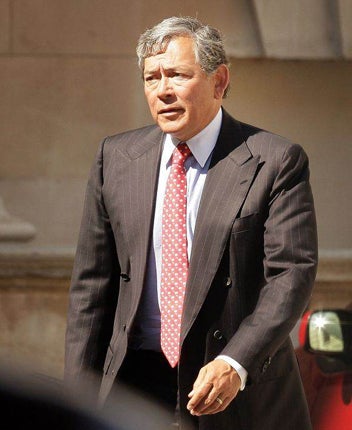Boss of state-owned Lloyds gets £2m bonus – six weeks before he quits

The controversy over bankers' bonuses intensified yesterday as it emerged that the Lloyds chief executive, Eric Daniels, is likely receive a £2m bonus – close to his £2.3m maximum – before he leaves the taxpayer-backed bank on 1 March.
Mr Daniels waived his payment last year but the Lloyds chairman Sir Win Bischoff – himself a longtime investment banker – said at the time: "We must find a way whereby remuneration models are agreed and voted on by shareholders without executives being put in a position where they feel they have to waive their rewards."
With Mr Daniels scheduled to depart the part-state owned bank he will feel scant pressure to give up his entitlement this time round. He could also be in line for a further £2m under the bank's "long-term incentive scheme" for work carried out in 2010.
The furore could intensify if, as widely expected, the new boss, Antonio Horta-Osorio, institutes a clear-out at the top of the bank.
Two directors are thought likely to depart after he replaces Mr Daniels: Truett Tate, head of the wholesale bank, is now at the retirement age of 60, while Archie Kane, who runs Scottish Widows, is 58.
Mr Horta- Osorio is known to be keen to reshape the top team in his image and has already hired two senior colleagues from the UK arm of Spain's Banco Santander to join him at Lloyds.
Insiders described the atmosphere among senior staff at the company's headquarters in Gresham Street, in the City, as "very, very nervous" last night.
But the terms of any departures from the bank's executive committee would prove hugely controversial given that the two men could be entitled to substantial pay-offs, based on their rolling 12-month contracts that entitle them to up to a year's money. Mr Tate's package nearly tripled last year to £1.81m from £690,000 and he was paid a £1.1m bonus. Mr Kane received £1.5m, up from £635,000, which included an £885,000 bonus. Mr Daniels was the only Lloyds executive to waive his bonus last year. He would qualify to receive something close to the maximum bonus for 2010, however, because Lloyds has largely met targets for cost-cutting in the wake of its controversial takeover of HBOS under Mr Daniels and returned to profitability after the financial crisis quicker than the City had expected.
That was, in part, driven by the cutting of more than 20,000 jobs. And the bank has only been able to achieve a return to profits because of the injection of £20bn in state funds, which gives the taxpayer a 41 per cent stake.
A Lloyds spokesman refused to comment last night, but sources close to the bank insisted that "no decisions have yet been made on bonuses".
However, even were Sir Win not a supporter of executive bonuses, the company would find it legally difficult not to pay Mr Daniels if the bank's performance matches the criteria contained for payment set out in its bonus scheme.
So far none of Britain's big four banks has publicly stated what they will do as regards executive bonuses, although Bob Diamond, chief executive of Barclays – which did not take any direct state aid – said he would "discuss the situation" with his family "if I am awarded a bonus" during an appearance before the Treasury Select Committee.
Mr Diamond has waived a bonus for the last two years as did the former Barclays chief executive, John Varley. Stephen Hester, chief executive at Royal Bank of Scotland, passed on his payment last year. However, Stuart Gulliver, the new chief executive of HSBC, took his £9m bonus last year when he was employed as head of the company's global banking and markets division. The then chief executive, Michael Geoghegan, also took his, but promised to give it to charity. Mr Gulliver would only say that he was "aware of my social responsibilities" when asked about his bonus.
The TUC described a payout to Mr Daniels as "outrageous" yesterday. Its general secretary, Brendan Barber, said: "Until Lloyds pays back the money it still owes UK taxpayers, the outgoing chief executive should not take such an outrageous bonus. The Government cannot stand idly by."
While bankers win, more than a million families lose
Despite a government guarantee that no existing benefit claimants will lose out when the new universal credit devised by Work and Pensions Secretary Iain Duncan Smith is introduced in two years' time, the Institute for Fiscal Studies says that 1.4 million families will be worse off in the long run. That's because the transitional arrangements ignore inflation.
In addition, most families with more than £16,000 in savings and lone parents who receive adult maintenance payments from absent spouses will be hit. And the "localisation" of council tax benefit – powers are soon to be transferred to councils to make their own decisions on eligibility – will "seriously undermine the point of universal credit", according to the IFS.
While confirming that the new universal credit will be "progressive" and mostly improve incentives for people to move off benefits and take on low-paid work, the IFS also identified clear sets of winners and losers, in stark contrast to official claims that no one will lose out.
Some 2.5 million families will be better off, and poorer families will gain more than better-off families. On average, single adults will be £1 a week better off, couples without children £2 to the good, couples with children £7 better off and lone parents with no other means will see their income improve by £6 a week.
Sean O'Grady
Subscribe to Independent Premium to bookmark this article
Want to bookmark your favourite articles and stories to read or reference later? Start your Independent Premium subscription today.

Join our commenting forum
Join thought-provoking conversations, follow other Independent readers and see their replies